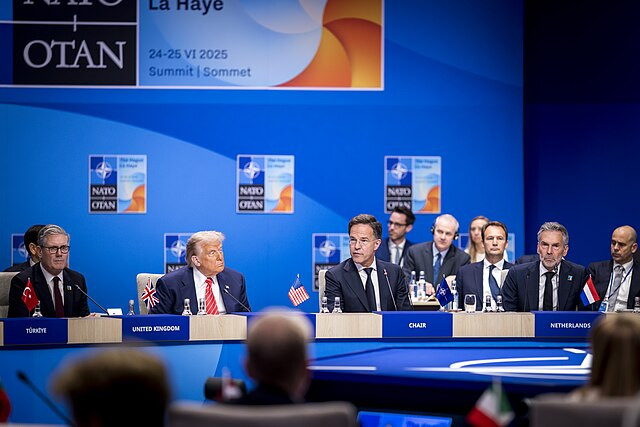President Donald Trump declared his continued support for NATO during a summit in The Hague on Wednesday, even as Republican Senator Mike Lee of Utah introduced legislation to pull the United States out of the military alliance. The move underscored widening tensions within the GOP over America's global defense commitments and NATO's future role in U.S. foreign policy.
"I stand with it. That's why I'm here," Trump said, referencing the alliance's Article 5 mutual defense clause, according to the Associated Press. "If I didn't stand with it, I wouldn't be here."
Hours earlier, Lee introduced the "Not A Trusted Organization (NATO) Act," which would require the president to formally initiate the U.S. withdrawal process in accordance with Article 13 of the North Atlantic Treaty and block federal funding to the alliance. "NATO has run its course - the threats that existed at its inception are no longer relevant 76 years later," Lee said in a statement. "If they were, Europe would be paying their fair share instead of making American taxpayers pick up the check for decades."
Lee added, "My legislation will put America first by withdrawing us from the raw deal NATO has become."
The bill appears unlikely to advance, given existing legal hurdles and bipartisan congressional support for maintaining NATO membership. In December 2023, lawmakers passed a provision in the National Defense Authorization Act requiring Senate approval or an act of Congress before any U.S. exit from NATO can proceed.
Lee also introduced two related bills this week-the Allied Burden Sharing Report Act and the NATO Burden Sharing Report Act-aimed at increasing transparency around defense spending among alliance members. Republican Senators Rand Paul and Marsha Blackburn backed the companion proposals. These bills "will shine a light on who's paying their fair share-and who's not," Blackburn stated.
At the summit, NATO Secretary General Mark Rutte emphasized the alliance's progress on defense commitments, including a new agreement targeting 5% spending among member states. Trump, whose past remarks have cast doubt on U.S. commitments to multilateral organizations, welcomed the announcement and said NATO remains central to American defense strategy.
Michael Williams, a professor at Syracuse University's Maxwell School who attended the summit, told Newsweek that intra-alliance tensions remain. "The question is whether the Europeans are using this summit to buy time for their own capability development, or if they truly believe the U.S. is still a committed ally," he said.






